Parshat Kedoshim

The quintessential “Here’s how to act properly” Parsha
“You shall be holy, for I, the Lord, your God, am holy”. Leviticus 19, 2
Having been imbued with the 10 Commandments Hashem continues by giving the basics of how to live with civility in this world.
We need civility more today than ever!
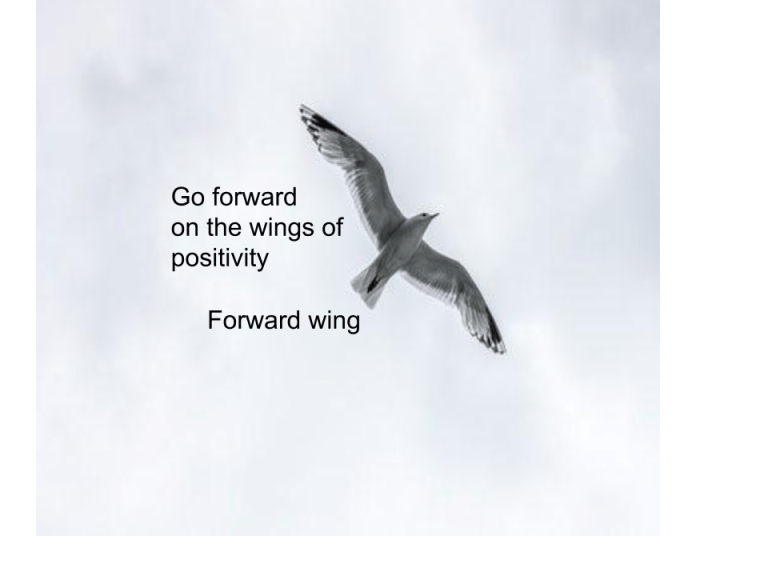
Being “Holy” seems daunting, but at the end of the day acting respectful, unselfish and kind to others is the glue that holds civilization together
Parsha Acharei
This weeks #parsha Acharei opens w/ the death of Aaron’s sons after they brought an uncalled-for fire pan to Hashem. They wanted to come close to Hashem. But why did they die?
Maybe the lesson as to why they died is that the best way to be close to Hashem is to do Hashem’s will by bringing others to Hashem.
Is
Question: Is my relationship with Hashem more important than caring about others? Is is not selfish to turn a blind eye to those spiritually undernourished while satisfying my needs?

Parsha Tazria
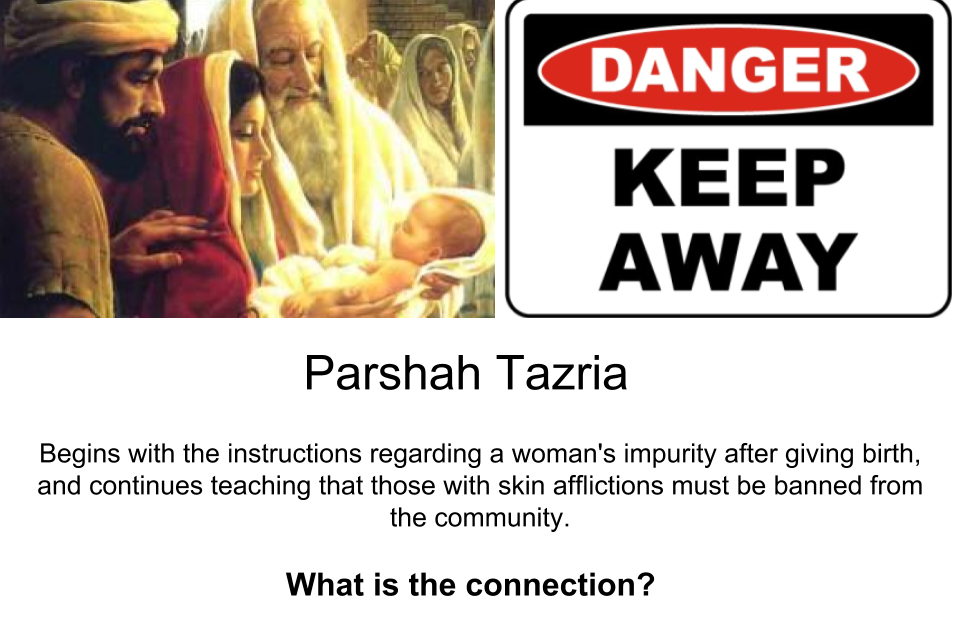
Why does a woman become impure after giving birth? And how can this be related to the skin afflictions that we can get from the sin of lashon hara, which is translated as “evil tongue or malicious gossip”?
It is easy to understand that the perpetrator of speaking distastefully is punished by being banned from the community.
But I propose the invaluable lesson the Torah is teaching is that when a new soul enters this world and as the child is developing it is the Mother who is most influential on the child furthermore it is the lessons of youth have most impact throughout ones life.
That having been said, this is the one chance to get it right. The first 4 years or so can bring out the greatest potential of a person or destroy one’s essence. It is the mother who is charged with the responsibility to bathe the child in the most choice of words, words of love, kindness and strength. She needs to imbue the child with the purpose of life and morals as set forth in the Torah.
The impurity of the mother after birth is designed as a wake up call to remind her of the importance of impurity and consequences that occur if you fail to raise children correctly.
The lesson is far more important regarding giving birth to a girl as she will ultimately raise the next generation herself. Hence the longer period of impurity.
Parsha of March 23rd Parsha Vayikra
Is understanding our relationship with animals and why we are instructed to sacrifice them the key to understanding our relationship with Hashem?
Nothing written in the Torah is unimportant or redundant Everything offers amazing wisdom and is relevant in every generation.
Why then does the Torah devote such an enormous percentage of itself to animal sacrifices? From the intricate details to the wide variety of types of sacrifices?

Last Weeks Parsha Pekudei
Pekudei is translated as “taking an accounting”. Moshe had to take an honest accounting of all the materials donated for the purpose of building the tabernacle / sanctuary as well as the priestly garments. Moshe himself did the intricate and difficult work of erecting the tabernacle.
The end of this Parsha marks the conclusion of the second book of Shemos (Exodus) when the construction was completed. From that moment forward… “And the cloud covered the tabernacle, and the glory of the Lord filled the sanctuary.” Exodus 40,34
What a beautiful conclusion to the book Exodus. It began with a people being suppressed by difficult servitude and miraculously brought out. Then in the harsh conditions of a desert the revelation of Hashem, the Creator of the universe gives this people his book of instructions. The laws and know how to create a just society, conduct affairs properly and build a nation.
Moreover, the instructions to build the physical structure as a place to connect to Hashem, as well as the clothing that will enwrap the supervisor or priest who will see to its implementation.
The Torah alludes that the structure we are building is our own character traits and the clothing the priest needs to wear is our external conduct.
The accounting of the donations or gifts represents the gifts Hashem has given us. We must all take an honest accounting of ourselves and use our gifts to their fullest potential.
Just as the clouds of glory of Hashem filled the tabernacle, we need to be cognizant of Hashem within ourselves.
Therefore it is fitting to conclude that each of us individually needs to:
Be Strong, Be Strong
and as the Nation of Israel, as a community together
May we be strengthened
Week of March 9th Parsha Vayakhel
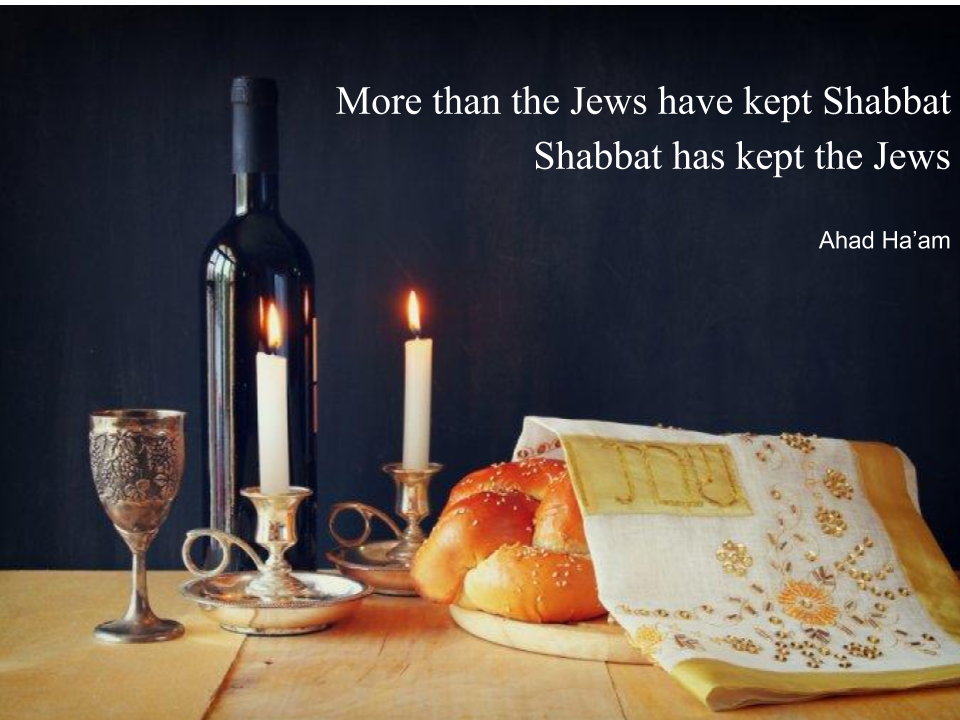
This weeks Parsha is Vayakhel. Vayakhel means to assemble. Moshe assembled th entire Nation of Israel together to reiterate the importance of keeping the Shabbat. Although Shabbat seems to be less important than the other Ten Commandments, it is actually the glue that keeps the Jews united. Hence the quote from Ahad Ha’am also known as Asher Zvi Hirsch Ginsberg:
“More than the Jews have kept Shabbat – Shabbat has kept the Jews”
Week of March 1st Parash Ki Tisa

One of the most difficult scenarios to understand takes place in this weeks Parashot
Hard to believe after witnessing a multitude of miracles including direct communication from HaShem at Mount Sinai the people make a golden calf and commit other improper acts. There are many commentaries that fill in the gaps with the behind the scenes information. The Midrash is one such place to find this information. I recommend the series The Midrash Says.
Hashem wants to destroy the Nation of Israel and Moshe intervenes
Moshe himself looses it, and destroys the newly formed tablets containing the 10 Commandments. Moshe then Negotiates with Hashem on behalf of the nation for forgiveness. From this we learn that Hashem is always open to human intervention regarding even the gravest of sins.
Week of Febuary 22 Parsha: Tetzaveh

Who says clothes don’t make the person?
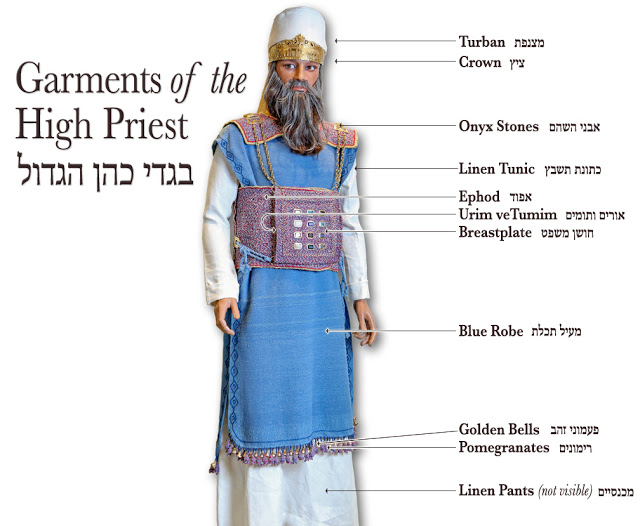
Like Terumah, this Parashot also contains very detailed, malicious instructions concerning how to “serve” Hashem. Many responsibilities are for the Kohanim including the elaborate outfit.
A Kohein or priest is defined as Aaron, Moshe’s brother or his direct descendants.
Week of February 15th Parashot: Terumah
Build, develop, refine, grow…..
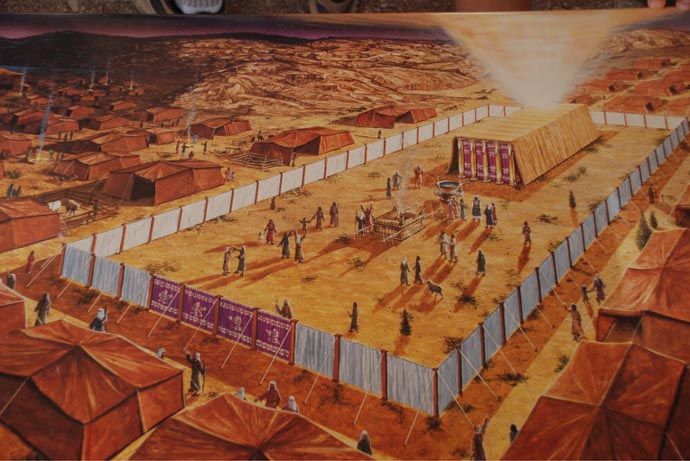
Detailed instructions are given for artistic as well as structural assembly.
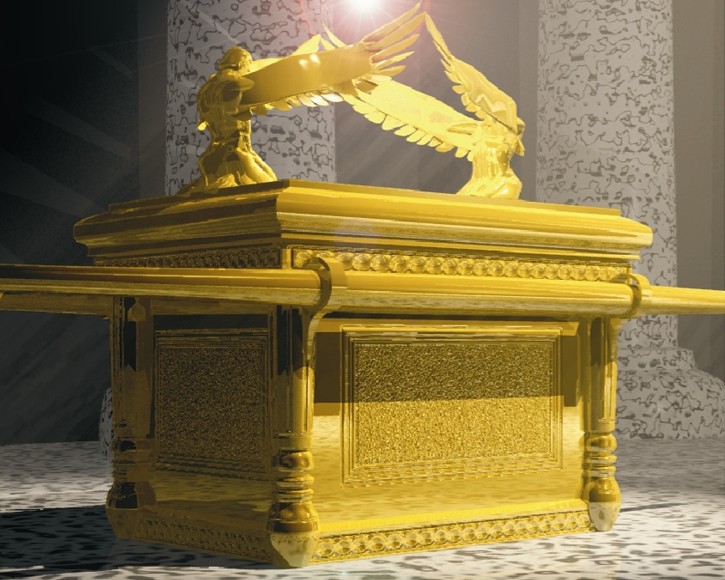
“And they shall make Me a sanctuary and I will dwell in their midst” Exodus 25:8
Build a Mishkan and He will dwell. Same holds true for ourselves. Life is the journey of building ourselves based on Torah values.
To take it a step further: Although HaShem is always with us, in striving to make our physical selves worthy as a dwelling place for HaShem, the side effect will be a nation constantly working on self improvement and coming closer and closer to our Creator.
Week of February 8th Parashot: Mishpatim

Many of the rules and regulations that allow people to exist in a civil society are spelled out in Mishpatim
The reality is that if people want to live in a civilized society with other humans, there needs to be regulations. Like it or not, anarchy and civility are not exactly consistent with each other.
Regulations are not only what allows society to exist, it is literally what allows existence to exist.
Regarding the physical world, the universe is made up of various patterns of energy, particles, atoms and molecules that have various individual characteristics.

By definition, the only reason anything physical exists, or happens is because of the limitations, boundaries, regulations and the restrictions imposed on these particles or forces by what many call “Nature.” The tangible matter of the universe had to be separated and regulated in order for our reality to be something other than a universe that is disordered chaos. The second day of creation: And God said, “Let there be an expanse in the midst of the water, and let it be a separation between water and water.”And God made the expanse and it separated between the water that was below the expanse and the water that was above the expanse, and it was so. Genesis 1 6-7
Restrictions are necessary for our day to day activity. The examples are everywhere and in everything. In driving, we need road signs, lights, and lanes. In cooking we need restrictions. Salt is good but only in moderation. Restrictions allow language, art, and financial systems to function. A computer functions because of codes programmed using various combinations of zeros and ones. The examples are endless.Restrictions are necessary for our day to day activity. The examples are everywhere and in everything. In driving, we need road signs, lights, and lanes. In cooking we need restrictions. Salt is good but only in moderation. Restrictions allow language, art, and financial systems to function. A computer functions because of codes programmed using various combinations of zeros and ones. The examples are endless.
Without regulations, all of existence, absolutely everything from the living to the inanimate, from the tangible to the intangible, would cease to exist. Without restrictions, existence would melt into empty lonely chaotic muck.
Without restrictions mankind is reduced to an animal-like life of selfishness and self-gratification. And even our treasured domesticated animals are only of value after we have trained them with boundaries and restrictions.
To live in a civilized manner with others, some governing entity needs to be in place..
Weeks of January 26th Parashot: Yetro

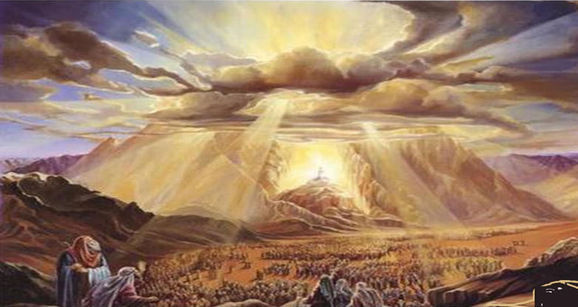
As stated on the welcome page Parshat Yitro is the parshat where G-d revealed Himself to humanity, and gave the Torah to the nation of Israel.
The significance of this event changed the world forever. The Torah is actually the link, the living connection if you will, that bonds the physical world with the spiritual realms.
The manufacturer of a complex product gives an operation manual along with the device. The Torah is essentially the instruction manual of the Creator given to the creation. The word “Torah” is translated as “Instruction”, “Teaching” or “Law”
Week of January 19th Parashot: Beshalach


Moshe! Your inspiration is contagious😁 May Hashem bless you and Karen with much inspiration, happiness and blessing. I hope others are inspired by your love of learning Torah.
One short vort I found on this parasha is that when life seems to send us impassable obstacles like the sea in our path and an army behind us, rather than falling apart just put our trust in the one above and take a baby step forward. Do our part to improve the situation even though our actions seem futile and the situation hopeless. May our trust in the almighty give us merit to have him split the sea of worry and doubt in our lives and bring the true and complete redemption for all!
Jewish women and mothers are blessed with ‘Binah Yoterah’ an extra measure of intuitive understanding through the quality of Binah associated with Gevurah ( contraction) expressed paradoxically in the ability to instruct and to decisively lead the way without hesitation or doubts.
In Parashat Beshalach 20 we read, ” Miriam the prophetess , sister of Aaron, took the tambourine in her hand and all the women went forth with tambourines and with dances.” Rashi comments,” The righteous women of the generation were certain that the Holy One , Blessed be He, would perform miracles for them, so they took tambourines out of Egypt”
A beautiful lesson is drawn from Tackling Life’s Tasks: HaYom Yom, compiled by The Lubavitcher Rebbe, Rabbi Menachem M.Schneerson, of righteous memory, for the 26th day the month of Adar 2.
“All that is holy in the nation of the G-d of Abraham and fundamental in for the House of Israel, in raising and educating an upright generation regarding the kashrut of food and the lofty purity of the holiness of Shabbat, was entrusted and endowed by the revered and awesome G-d to Jewish women to guard and to cultivate. To a woman who fulfills her obligation and calling in the area of of family life , directing her household and educating [ her children} according to the Torah , the following verse can be applied, “Chachmot nashim bantah bayta”
The wisdom of a woman builds her home.”
In their merit may we go out this exile with tambourines and dances!
I wish you much success, I remember how you always came to my mother Rebbetzin Jungreis’s torah classes. May Hashem give you the inspiration to inspire others and bring the to teshuva
Parashat Yitro highlights the challenges faced by the baal teshvah and ger tzedik ( righteous convert) to Judaism and the multiple rewards gained for their perseverance despite difficulty or delay in achieving success.These dynamics are beautifully played out in the relationship between Moshe Rabainu and his father-in-law Yetro.
The question is often asked, “Why is this parashah named Yitro? Exodus 10-11 stares Jethro said, “Blessed is Hashem, Who rescued you from the hand of Egypt and from the hand of Pharaoh, Who rescued the people from under the hand of Egypt.
Now I know that HaShem is greater than all the gods, for that which they schemed against them…!
We see that Yitro first said, Blessed is G-d, Baruch HaShem! But how did he come to know that Hashem is greater than all the other gods? Rashi gives us the simple answer by commenting, “This teaches us that he was familiar with all the idolatry in the world, that he did not leave a
single form of idolatry that he did not worship!” Yetro is referred to in the beginning of the parasha as ‘Jetro the minister of Midyan! In other words Jetro had achieved the highest degree of respect and authority in his society! Is such a legacy something to be proud or to to be ashamed of and to hidden?
Many of us who are now senior citizens, followed the parallel journey of Yetro leading to Haight-Ashbury or to India looking for “spirituality and light.”
Many of us were highly idealistic, artistically talented and determined to find success in a new and enlightened society. Unfortunately, our efforts and idealism were misplaced, crushed under the heavy influence of drugs and abandonment of morality. Is not this legacy something to be ashamed of and hidden, now that long hair and tie-dyed shirts have been replaced by black hats and white shirts?
Rabbi Yaakov said: One who walks on the road and studies {Torah} , and interrupts his studies and remarks ,”How beautiful is this tree! How beautiful is this plowed field.” Scripture considers it as if he were guilty of a mortal sin.( Pirkei Avot. Chapter 3)
How does one who grew up immersed in the art work of Vincent Van Gogh process this teaching into his or her current level of religious observance.observance? ‘What do I do now with my paint brushes and my guitar? How do I get from Midian to Jerusalem, without throwing away my guitar on the way?
Does anyone not have an uncle or relative that didn’t change his name more than once? Rashi comments that Yitro – “He was called by seven names: Reuel, Jether, Jethro, Hobab, Heber, Keini, and Putiel. He was called Jether, which means “extra” or “more,” because he caused one more Passage of the Torah to be written. He was called Jethro because when he converted to Judaism and fulfilled the commandments, they added the letter vav to hisi other name Yeter. He is called Hobab because he loved the Torah … “from the sons of Hobab, the father-in-law of Moses.” .
Fast forward! ‘”Moses went out to greet his father-in-law , and he bowed and he kissed him, and they inquired , one man to the other, about the other’s well being; then they came into the tent.” (exodus 7) Rashi comments, ” And Moses went out – Jethro was greeted with great honor,…for when Moses went out (to greet) Jethro – Aaron, Nadab, and Abihu also went out. And who would there be be who saw these (leaders of the people) and not go forth himself?” In other words, has other historical figure ever been given such a royal greeting?
Gur Aryeh, citing his brother , R’ Chaim of Frankfurt, Sifsei Chachamim, answers our questions by asking another question!
“Was Jethro merely seeking honor? Or did he have nobler intentions? Jethro sought to put an end to certain criticism regarding Moses marrying his daughter. Jethro wanted Moses to come forth on his behalf to show the world that Moses was not at all embarrassed to be Jethro’s son-in-law, despite Jethro’s earlier idolatrous life-style. But if Moses was indeed ashamed of his father-in-law’s past, then hr should come forth on hos wife’s behalf, to show that he was not at all embarrassed about her past and her family, thus removing any shame she may face.If Moses did not feel comfortable about this either, then, at the very least, he should come forth on behalf of his children to remove any stigma apparent in their pedigree. We can see here that the common denominator is the great respect that each had for each other. Rashi, comments in Exodus, Parashat Yitro 18) “Here Jethro felt himself honored through Moses, (as if he were saying)- ” I am the father-in-law of the king.”-
while in the past Moses attributed his greatness to his father-in-law as it says, “And he returned to Jether, his father in law.’
We see that Moses accepted Jethro’s suggestion to appoint and enact a rabbinical court of elders to judge the people, which is the basis of Jewish jurisprudence, our Batey Dinim..We see the humility of Yitro in daring to advise Moses in this matter, (Exodus. Parashat Yitro 19,)
-“I shall advise you , and may G-d be with you- in the advice , “Go out and consult the Almighty,(to see if my advice is sound.
The baal tesuva and the ger tzedik can learn fromf Moshe and Yitro that there is a place for you, bring holy books and your guitar and your paintbrushes with you to serve HaShem with your past, present and future!
“The essence of of peace is to merge two opposites. Therefore your notions should not scare you. If you see another , who absolutely oppose you and you presume there is no no chance for peace between the two of you. On the same token when you see two individuals who are exactly two opposites, never say it would be impossible for them to reconcile. On the contrary, and this is the perfection of peace to make peace between two opposites.”
“All new beginnings require that you unlock a new door!”
Rabbi Nachman of Breslov
Thank you Yaacov. Amazing commentary. There is so many pearls of wisdom here. We should embrace our past (what a long strange trip its been) especially if it led us to Torah. Baruch HaShem !
Pararshat Mishpatim.
Turning Over a New Leaf: part 1
In last week’s Torah portion Yitro , we read the Ten Commandments, and this week’s Torah portion Mishpatim begins with the purchase proper treatment of Hebrew slaves. One might have thought following the giving of the Ten Commandments that Parashat Mishpatim would begin with a more elevated, lofty and spiritual subject than the purchase and treatment of of slaves , generally, the most degraded of men and women.
Chassidut [practical Jewish Kabalah} teaches that before the giving of the Torah there was a disconnect between the spiritual and the physical. And although our fore fathers Abraham, Issac, and Jacob kept the entire Torah, observed the commandments, the physical remained physical and was unconnected to the spiritual. The giving of the Torah radically changed the order of reality when G-d descended on Mt.Sinai and Moses ascended Mt.Sinai. Then physical became spiritual and the physical became bonded to the spiritual!
Chassidut teaches the concept of ‘awakening from Above and the concept of’awakening from below.’ The ‘awakening from Above’ comes from G-d on High , while the ‘awakening from below’ corresponds to our reaching upward, to serve G-d from below in the mundane world. Servitude in Hebrew is ‘Avodah’, and an observant Jew is called an Eved HaShem, a servant or literally a slave. of G-d! Therefore this type of bondage must be radically different from the historical practice of slavery! Exodus 21:2 ‘Should you buy a Hebrew slave, he shall work [for[] six years , and in the seventh year [year] , he shall go out to freedom without charge.’
From the teachings of Rabbi Shimon bar Yochai with translation and commentary by Rabbi Moshe Miller, we read: A Jewish person can become a slave in one of two ways : a) Due to extreme poverty, he sells himself. (In this case the slaves master is obligated to treat him as a hired laborer rather than as a slave per se, providing for his needs and those of his entire family. ( see Lev.25:39) This is not the type of slave discussed below.) b) he is sold by the court after conviction as a thief, if he does not have the means to repay what he stole.
‘If you buy a Jewish slave, he shall work for six years and in the seventh year be shall go free, without liability.” Rabbi Shimon said to his circle of disciples: Now is the time to reveal a number of closely-guarded secrets concerning gilgul [reincarnation].’If you buy a Jewish slave, he shall work for six years.”- this applies when the soul must be reincarnated, either because of sin or because it failed to completely fulfill its obligation in Torah and mitzvot [commandments] while alive in this world….. However, if the soul is from the Shechina malchut of Atzilut , the seventh of the emotional sefirot [fiats] , corresponding to Shabbat, the seventh day, what is written? “In the seventh year he shall go free, without liability,’ because a righteous tzadik [holy person] who has merited a soul from malchut of Atzilut [ the closest or nearest level of closeness to
G-dliness in the upper worlds] does not have any work in the sense of rectification. Accordingly, the gilgul [reincarnation] for such a soul is not a punishment of any sort, but for another purpose-for the sake of benefiting the world and providing leadership. Such a soul is comparable to the Sabbath, the seventh day, when all types of [creative] work are prohibited…….”Although the soul of a righteous tzadik [ holy person] from the world of Atzilut is obligated to descend into this world , and to be reincarnated even into beasts of the forest, it nevertheless does not have to do any work [of rectification]. This is the meaning of “you shall not work him like a slave.’ (Lev.25:39) in regard to a tzadik, who is the Sabbath day, ” yous shall not work him like a slave,’ who is the weekday.’
Please read the unabridged article by Rabbi Moshe Simon, The Secret of Servitude. http://www.chabad.org.
Parashat Mishpatim
Turning Over a New Leaf. Part Two
Having discussed gilgul (reincarnation) one can find a very deep reference to this concept in the Prayer Before Retiring At Night found in the Nusach AriZal Prayer Book .”Master of the universe! I hereby forgive anyone who has vexed me, either physically or financially, against my honor or anything else that is mine, whether accidentally or intentionally, inadvertently or deliberately, by speech or by deed, in this incarnation or in any other– any Israelite; may no man be punished on my account.
If one says this prayer with sincerity, it would become very difficult to hold onto a grudge and remain angry at anyone who has offended us during the previous day, either in this lifetime or even during a previous lifetime! This is the healing power of prayer!
The physical environment that we live in is built on a hierarchy: inanimate matter, the vegetable kingdom, the animal kingdom and Man.
Not only does G-d expect Man to treat the lowliest and neediest members of society,i.e, slaves humanely, we also have a responsibility
to do so, progressing downward, by not causing undue pain to animals; to preserve our environment and forests, but even to respect inanimate objects? In the Tanya, Shaar Yichud VehaEmunah /Chapter One, it is stated, “And so it is with all created things, in all the upper and lower worlds, and even this physical earth and the realm of the completely inanimate. If the letters of the Ten Utterances by which the earth was created during the Six Days of Creation were to depart from it for an instant, G-d forbid, it would revert to naught and absolute nothingness, exactly as before the Six days of Creation. This thought was expressed by the AriZal [Rabbi Issac Luria] when he said that even that which appears to be utterly inanimate matter, such as stones or earth or water, there is a soul and spiritual life-force.”
This idea is beautifully expressed in the following story, form Rabbi Yosef Yitchak Schneerson, the sixth Lubavitcher Rebbe, of righteous memory, words and condensation by Rabbi Tzvi Freeman, Chabad.org.
Purpose of a Leaf
Every movement of every leaf blowing in every breeze breathes with Divine purpose.
As a young boy, Rabbi Yosef Yitzak ( the sixth Lubavitcher Rebbe) would go with his father on walks through the woods. One time, as they walked, the boy absent-mindedly plucked a leaf off a tree and began to shred it between his fingers.
His father saw what his son was doing, but he went on talking. He spoke about the Baal Shem Tov [founder of the Hassidic Movement], who taught how every leaf that blows in the wind-moving to the right and then to the left, how and when it falls and when it falls to –
every motion for the duration of iits existence is under the detailed supervision of the Almighty.
That concern the Creator has for each thing, his father explained, is the Divine spark that sustains its existence. Everything is with Divine purpose, everything is of concern to the ultimate goal of the entire cosmos.
Now,” the father gently chided, ” look how you mistreated so absently-mindedly the Almighty’s creation.”
He formed it with purpose and gave it a Divine spark! It has its own self and its own life! Now tell me, how is the ‘I am’ of the leaf any less than your own ‘I am?’
If we can learn from this story that a tiny leaf deserves our attention and respect how much more so should we treat each other with the same measure of respect, kindness and dignity
“While praying, listen to the words very carefully. When your heart is attentive, your entire being enters your prayer without your having to force it.”
Rabbi Nachman of Breslov
Great essay, Just a thought… The English language, unfortunately has a lot of limitations. The word slave should be divided into many words since it has many meanings both good and bad. In the scene you talk about regarding our relationship to HaShem it means complete commitment and acknowledgement of our creator and knowing everything is ultimately for our benefit. The divine spark is in everything.